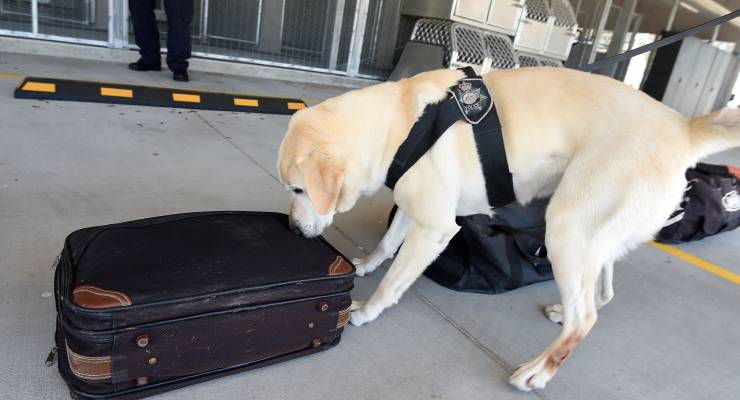
The last place you’d expect to see a sniffer dog is at the entrance to your suburban train station, but that’s exactly what greeted public transport users in Melbourne’s south-east this month as part of Victoria Police’s operation to target drug possession on the network.
In Sydney, the use of sniffer dogs at music festivals over the weekend has been criticised by festivalgoers, and renewed calls for it to be scrapped.
And with evidence suggesting the use of sniffer dogs leads to an erosion of civil liberties and an increase in drug-related harm, why is Victoria Police using them? And does it undermine the government’s efforts to combat overdose rates using supervised injecting rooms?
For Victoria’s medicinal cannabis users — who are prohibited from driving under the current system — public transport is one of their only means of transport.
David Limbrick, a Liberal Democratic member of Victoria’s Legislative Council, told Crikey: “Medical cannabis patients should be concerned about being searched, despite having a legal prescription.” Fellow Legislative Council member for Legalise Cannabis Victoria Rachel Payne said she was concerned that “Victoria Police simply do not understand medicinal cannabis is a prescribed medication, and more often than not, treat patients like criminals”.
“We know in Victoria that there are roughly 10,000 arrests a year for cannabis-related crimes, with 92% of those being for possession alone,” Payne said. “So why are we criminalising users and not drug dealers?”
The use of drug-detection dogs has long been dismissed by experts as ineffective and invasive. Studies from NSW suggest drugs aren’t found in 63% of searches. This was even less in South Australia, where 82% of searches came up with nothing.
With potentially only an 18% chance a sniffer dog has correctly determined you’re in possession of a potentially illicit substance, this means you could be subjected to a potentially humiliating and invasive search in public. A study released last week by the Law Enforcement Conduct Commission found that in more than 70% of cases, NSW Police failed to protect the dignity of people being searched.
As RMIT academic Peta Malins told Crikey, this can lead to lasting trauma: “My research has shown that the searches can cause feelings of shame and stigma, and can also lead to lasting trauma, especially for people who end up being strip-searched and especially for people with prior experiences of sexual trauma.”
When Victoria Police launched a sniffer-dog operation at Frankston station last month, Acting Sergeant David Healy told Bayside News: “If you have nothing to hide, then you won’t mind engaging with our detection dogs.”
But surely Victoria Police can’t presume people on public transport are ambivalent about being subjected to invasive searches on their way home from work?
A comprehensive study conducted in NSW in 2006 showed only 0.19% of searches had resulted in prosecutions for drug supply — and that was primarily at festivals. Are we expected to believe big-time drug dealers are shifting product on our public transport system? Instead, with no clear guidelines on what constitutes drug detection, sniffer dogs are used to target vulnerable members of the community.
Evidence suggests sniffer dogs don’t deter people from carrying or using drugs. Malins’ research suggests it simply encourages more dangerous efforts, such as hiding drugs in internal bodily cavities, buying from unknown sources at the point-of-use, shifting to more dangerous but less-detectable drugs, pre-loading drugs, or panic ingesting dangerous quantities when dogs approach.
Limbrick agrees: “They provide no benefit to public health and little to no benefit to policing.”
It seems counterproductive for the government to facilitate supervised injecting rooms to reduce drug-related harm, while simultaneously subjecting substance users to the threat of punitive searches on the public transport system. Would the government prefer if substance users drove? Somehow, I doubt it.
With no obligation to document how many searches have been conducted, or how many illicit drugs were found, this just feels like another cynical display of force by Victoria Police, one that will target everyday members of the public — and not the criminals they intend to prosecute.
A Victoria Police spokesperson said to Crikey, “Victoria Police regularly conducts public safety operations at major public transport hubs to detect and deter anti-social behaviour. The highly visible operations see police engage with commuters in and around train stations to ensure safety.”
“The operations can include the use of passive alert detection dogs. The dogs are trained to detect a range of illicit drugs, which gives police reasonable grounds to perform searches under the Drugs, Poisons and Controlled Substance Act. For a passive alert detection dog operation to occur, police must provide intelligence to demonstrate there is known drug activity in the area.”
“The dogs recognise medicinal cannabis. In this event, the person is asked to show their prescription.”
Does the use of sniffer dogs anywhere — airports, music festivals, trains — offend you? Let us know by writing to letters@crikey.com.au. Please include your full name to be considered for publication. We reserve the right to edit for length and clarity.








Healy is wrong. I can only speak for myself, but regardless of whether I have anything to hide, I most certainly do mind being harassed, delayed or inconvenienced without proper cause by police while I attempt go about my lawful business.
As the NSW Parliament L/C enquiry found, fewer than 25%of dog alerts are positive.
It’sjust tough that 75% of people stopped and harrassed by thugs by badges, guns & an overweening arrogant self of privilege did indeed have nothing to hide, or nothing more to hide in the case of those made to stripped without reason.
A question asked of those who want to join the dog squad is “What does a handler have to know?” to which the incorrect answer is “More than a dog!”.
Agree. I strongly object to having a dog sniffing my privates with a policeman on the other end of the lead
As a medicinal cannabis user, who doesn’t go everywhere with my prescription, this amounts to harassment by police.
In Sydney, these sniffer dogs never seem to set up at the exits of the Big 4 consultants skyscrapers, the Philip St legal chambers district or the carpark of Parliament House. Or the nearest bars to the above.
If ever there was a single more reliable set of locations that would really, really bump up the detection rates (but not the conviction rates, obviously), then I can’t think of any & this includes rural doof doof festivals.
Even restricting the humiliation to just black Range Rover Sports occupants would still quadruple the hit rate, double that again on Friday nights.
If you’ve got nothing to hide then you won’t mind the police dogs sniffing around and the police searching your bags. If you’ve got nothing to hide then you won’t mind the police searching your clothes and your body. If you’ve got nothing to hide then you won’t mind accompanying the police to the police station. If you’ve got nothing to hide then you won’t mind answering some questions from the police without your lawyer present.
The government is just protecting the community. That’s the way it’s done???
That is pretty much how I see it too John. Well said.
I think you missed the irony there Robert.
If John’s post was meant to be ‘ironic’ or sarcastic or whatever, then that is very sad. If it was in that vein then it certainly reflects the mindset of many around here.
It’s also highly discriminatory to only do this on public transport. Imagine if the police with their dogs were stopping private vehicles at checkpoints, and searching the drivers? There’d be an outcry.
True, but surely nobody could expect anything else? It’s always been a prime function of police to keep the lower classes and various minorities in their place, and before there were police the same job was done by local militias and so on.
That already occurs when the Drug Bus is at a random breath test stop – ie the one usually to be seen wasting time, resources & blocking traffic on the eastern approach to Bathurst.
Maybe Acting Sergeant Healy should postpone sending out the dogs until he can get the success rate up above 90% instead of just chance.
But this misses the point. The dogs aren’t there to sniff drugs. They’re there to inimidate.
I would seem to me that the dogs are responding to unconscious signals from their handlers, who are as full of prejudices as most humans. Have they tried sniffing dogs with unfamiliar handlers? They may improve their strike rate.
Public transport? Yeah, that’s the preferred mode of travel by drug dealers…. FFS. They keep telling us that their focus is supply and then they do this stupid shit and it wouldn’t be cheap.
“Let’s hit the vulnerable… They’re an easy mark”.
I don’t disagree with the thrust of the article, but what sort of dogs are being used?
If labradors as in the accompanying photo, they are hardly intimidating. As an owner of a German Shepherd, the more usual Police dog in Victoria, I can attest that while it might look intimidating, I doubt it has the temperament to be a sniffer dog (too intelligent).
The intimidation comes from the fear of being caught, not from the scariness of the dog. It’s all theater. Most people believe that the dogs can sniff drugs with pinpoint accuracy.